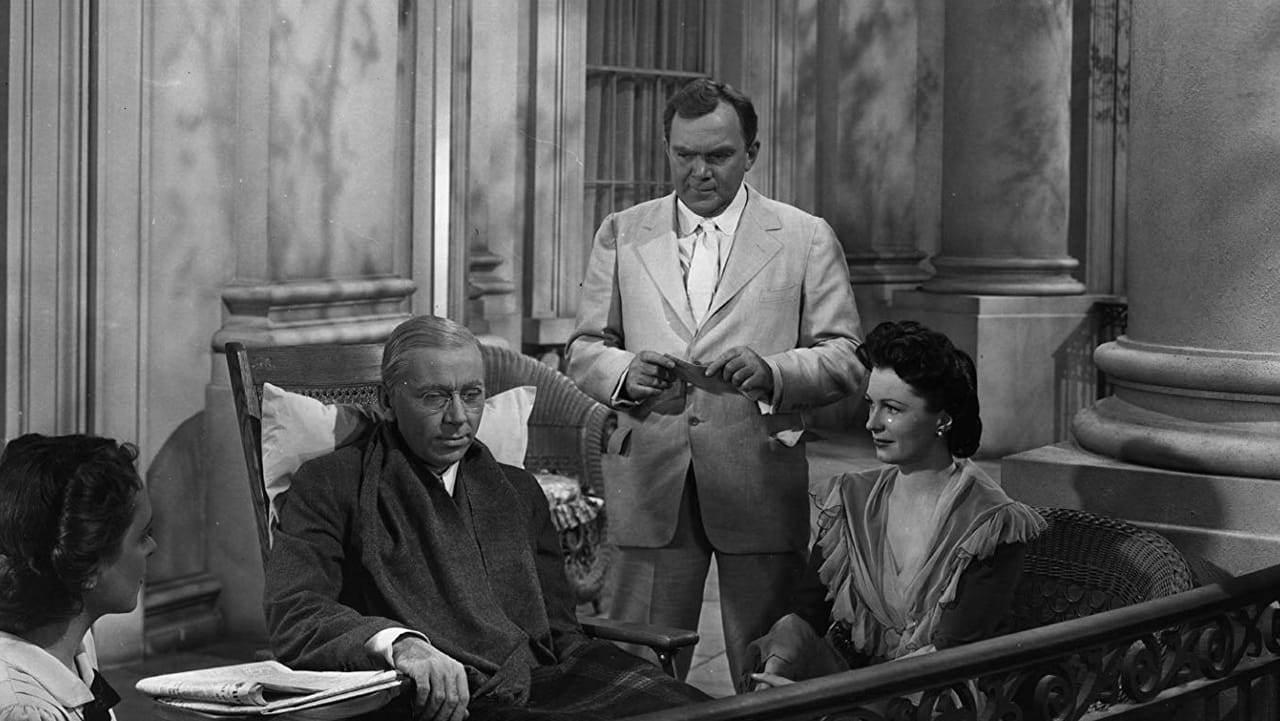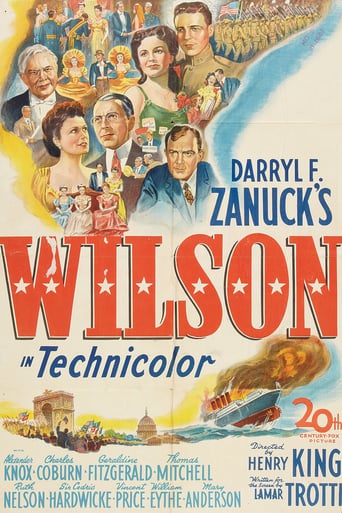

just watch it!
... View MoreBest movie ever!
... View MoreThe movie turns out to be a little better than the average. Starting from a romantic formula often seen in the cinema, it ends in the most predictable (and somewhat bland) way.
... View MoreAmazing worth wacthing. So good. Biased but well made with many good points.
... View MoreWhen "Wilson" debuted back in 1944, it was a box office bomb. Yet, inexplicably, it received 10 Oscar nominations and took home five of the statuettes. What gives....why the disconnect? Well, I think Wilson was the beneficiary of patriotism...at least within the film industry. During the US involvement in WWII, AMPAS (the Oscar folks) promoted many of the more patriotic films...and a few decent films received Oscars when better, but less overtly patriotic, movies didn't. This film and "Mrs. Miniver" are both great examples of films winning Oscars that probably wouldn't have had the US not been at war...but this is especially true of "Wilson", as it was a long but rather uninspiring film...and I think the cinema going public WAS right about this one.My dislike of parts of "Wilson" is because the film seems more concerned with being a propaganda piece than giving us a true portrait of the man. Wilson was the guy who seemed more than happy to keep black Americans 'in their place' and was also the man whose campaign slogan for the 1916 election was 'He kept us out of the war'....and then promptly declared war on Germany just a month into his second term! Clearly, he was a flawed man and history today does not see him so fondly as the movie does...especially because you can't help but wonder if they world would have a better place had the US stayed out of WWI.Instead of showing the flaws, the film goes the other direction...practically elevating Woodrow Wilson to sainthood! He simply doesn't make mistakes in this film and often he is shown (literally) with an angelic chorus singing in order to hammer home just how godly and perfect the man was. Basically, this is an overly sentimental whitewashing of the man...more meant to bolster support in the States both for the war and the new United Nations. The bottom line is that if you want to know about Wilson, you could either watch a 2 hour and 38 minute film and get a somewhat sanitized and one dimensional portrait...or you could just read about him and learn who he really was.
... View MoreDescribed by the great British actor Roddy McDowall as "pure chloroform" it is not too difficult to see why a bio of the the most sociopathic and racist president in U.S. history since Jackson would put you to sleep - you edit out all the evil episodes of this freak's life and you end up with a snoozer. Woody got a break when he dropped dead in 1924, he didn't live long enough to see the judgment of Nuremberg. Strip out the racism, the segregation of the Army, the callous disregard of the rioting of the Red Summer of 1919, when this piece of human garbage stood by and did nothing while thousands of Americans were murdered in the streets. What's left? Only boredom. It's the best obituary this of trash could have hoped for, this man who , to paraphrase Churchill, represented the one of the most "discreditable" periods in American history.
... View MoreI expressly watched this on the same day as ANTHONY ADVERSE (1936), despite there being at least five titles which ought to have preceded it, on account of both these films emerging as perhaps the most overlooked of all the ones that had proved multiple Oscar winners. This, in fact, had an impressive 10 nominations to its name and, even if it only won half of them, it was still a considerable feat at the time: Best Original Screenplay (Lamar Trotti), Color Cinematography (Leon Shamroy), Color Art Direction/Interior Decoration, Editing and Sound Recording, while its other nods were for Best Picture (personally produced by Fox head Darryl F. Zanuck), Direction, Actor (Alexander Knox in easily the role of his life), Scoring of a Dramatic or Comedy Picture (Alfred Newman) and Visual Effects.The film deals with the career and personal life (encompassing two wives) of the 28th American President, Woodrow Wilson, whose two terms of office lasted from 1912 to 1920, thus encompassing the First World War. However, for all its accolades, this was a notorious commercial flop – which can be ascribed to a number of factors, and not just the political elements within the narrative (the speechifying is often undeniably inspiring, yet it does eventually prove heavy-going at 2½ hours). Indeed, the quaint atmosphere redolent of the early 20th century (especially the collective singing, both at college and at home, which takes up a sizeable part of the running-time!) was already far removed from the conflict (WWII) that was under way when the film was released. Incidentally, Wilson's overly cautious attitude and his failed attempt to initiate a League of Nations in order to maintain world peace must not have gone down very well either – but, in retrospect, he would be vindicated as a visionary instead of a mere idealist when the United Nations was eventually established in 1945 (the opening text maintains he was as seminal a leader as George Washington and Abraham Lincoln)!Still, one of the main virtues here is the sheer number of stars and character actors roped in to comprise the supporting cast: Geraldine Fitzgerald (as the second Mrs. Wilson who, when the President suffers a debilitating stroke towards the end of his tenure, takes over for him in addressing routine official matters!), Sidney Blackmer, Charles Coburn, Marcel Dalio (as French Prime Minister Clemenceau), Eddie Foy Jr. (playing his own vaudevillian father), Thurston Hall (as the Senator who first recommends Wilson for the Governor's seat then sees his corrupt practices exposed by him!), Charles Halton, Sir Cedric Hardwicke (virtually unrecognizable under white whiskers and a wig as Wilson's political rival), George Macready, Edwin Maxwell (as William Jennings Bryan), Thomas Mitchell (as Wilson's secretary but who bafflingly keeps calling him "Governor" even after he has entered the White House!), Vincent Price (bearing a most unbecoming haircut!), Stanley Ridges (as the Presidential physician but also, apparently, a military officer since he is seen parading in full regalia at one point!), etc. Apart from the pleasure of recognizing so many familiar faces (including genuine newsreel footage of Silent movie stars "Fatty" Arbuckle Marie Dressler, Douglas Fairbanks and Mary Pickford rallying for the war effort), the elaborate campaign sequences are vividly-staged and the confrontations (notably Wilson's uncharacteristically vociferous putdown of the Kaiser's envoy and his similar outburst at the 1919 Versailles peace treaty) compelling – yet it is Knox's dignified but nuanced portrayal which holds the film together. By the way, the copy I watched (which, dim as it was, does not do the colour justice) was a rip off Spanish TV, with forced subtitles in that language!; for the record, the film was recently released as a Fox "Cinema Archive" DVD-R but the quality, reportedly, still leaves much to be desired!
... View MoreMy main reason for wanting to watch this film was to see how they depicted the politics of the signing of the Federal Reserve Act, signed into law by president Wilson on December 23, 1913. There was but a brief acknowledgment that yes he did sign it into law. But this single act by Wilson changed the future course of the United States in a more profound way than all the presidents and all the wars that have followed. It was this Act that funded those wars. It was the signing of this Act that gave the United States the ability to 'generate' literally unlimited amounts of money. I could go on, but I'm drifting off topic. The main emphasis points of this film's 'Wilson' consisted mostly of his rise to the presidency and his actions as president during the buildup of World War I and his involvement with the League of Nations. In my opinion, the complete lack of emphasis on the signing in of the Federal Reserve Act is a concerted attempt to downplay the significance of what it does and who it gives power to. Yet it defines the fundamental structure of American society today. This act was the billion volt shock that jolted the United States into the world power that it is today. Without the Federal Reserve Act, the world would be a completely different place. Someday, someone will make a film about it–but this one's not it. The beast that 'The Fed' has become since then is a whole other story.
... View More